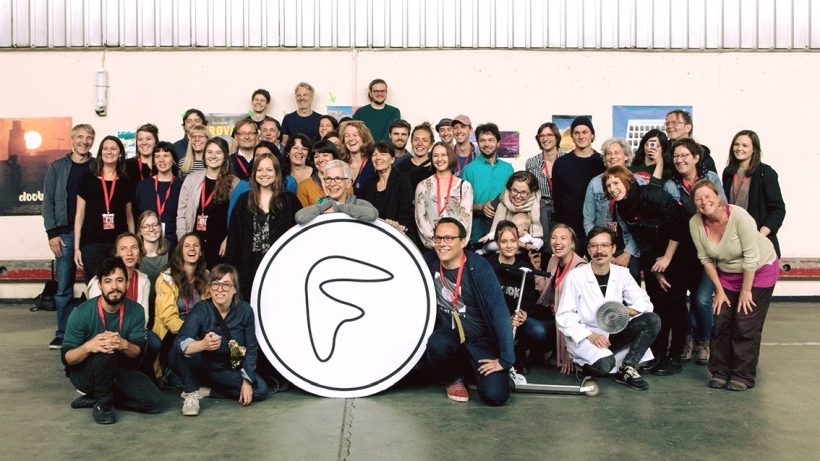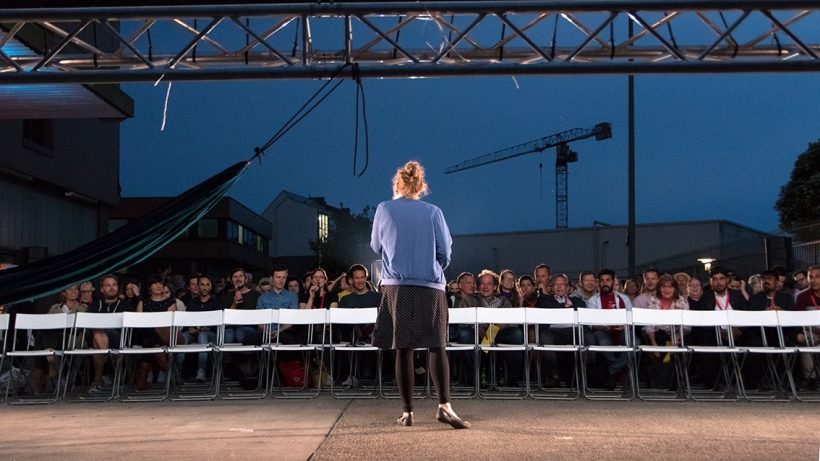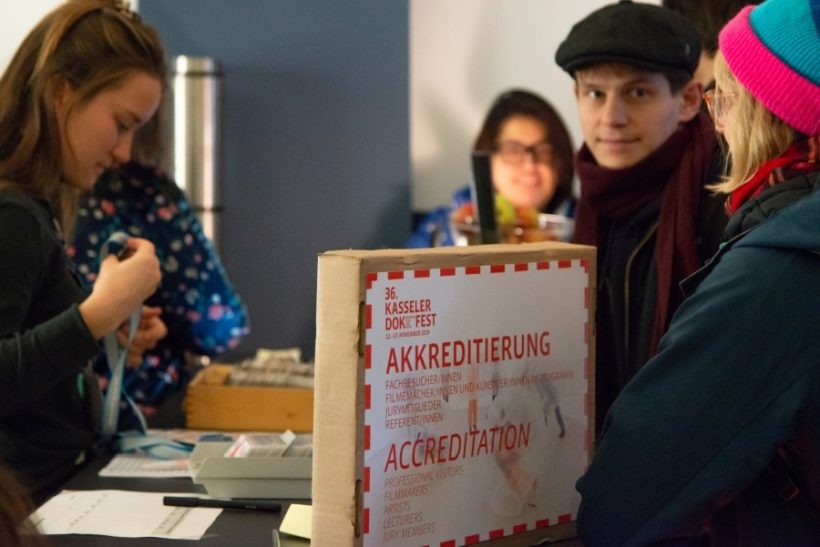
Team 2019 © Kurzfilm Festival Hamburg
In the first week of September 2020, the Short film Festival Hamburg decided that from then on it would charge fees for every film submitted to it. In the short film sector especially, this step is provoking much scrutiny, as festivals in particular represent the most important platform for filmmakers: Cinema releases occur almost solely for feature-length films, and while TV channels such as ARTE and several regional public TV broadcasters in Germany (MDR, BR, SWR, rbb) also screen short films in broadcast slots created specifically for them, the number of short films distributed this way compared to feature-length films and series is marginal. Hence, short film festivals and festivals with short film programmes have quite a significant responsibility vis-a-vis the community, as hardly any money can be earned due to the minimal marketing options available. Moreover, short films often represent the first opportunity for young filmmakers to present themselves.
Thanks to the rapid development in digital technologies over the last decade especially, this has become easier and cheaper than ever before. Like with all players, festivals have had to react to this development. And not only does this impact on the screening technologies, which have already become dominated by digital formats, but on almost all other festival preparation and organisational areas as well – including the submissions.
Thus, it is of little surprise that the numbers of short film submissions have skyrocketed over the last few years. In Hamburg especially, quite a sharp increase has occurred: 4,500 entries were submitted in 2019, with this growing to 6,000 by 2020, an increase of a third. At the International Short Film Festival Oberhausen as well, the numbers have risen continuously: From just 2,500 festival submissions in 1998, growing to 7,000 in 2018 and reaching 7,600 in 2019. At Berlinale Shorts, submission numbers were growing by 400 each year. At the moment, numbers have reached around 4,000 submissions.

© Kurzfilm Festival Hamburg
Hamburg is not the only festival by far to take the decision and raise submission fees. In fact, it represents a trend that commenced in Germany about two years ago. When this situation is discussed with the festival organisers, quite a divergent viewpoint occurs, revealing how varying the reasons are for and against charging submission fees – ranging from administrative to commercial, through to moral considerations. And the weighting accorded to the reasons differs depending on the size and focus of each festival. Large festivals, such as the Berlinale Shorts and the short film section at DOK Leipzig, have always charged fees, while smaller ones, such as the Kassel Dokfest or the Landshut Short Film Festival, remain opposed to submission fees. The International Short Film Festival Oberhausen and the International Short Film Week Regensburg charge fees for specific submissions in order to discourage mass submissions and latecomers.
Shifting of the Administrative Costs onto the Festivals
For festivals, the increase in the submissions has meant having significant administrative outlays. With the related costs now shifting from the filmmakers over to the festivals. The interfilm – International Short Film Festival Berlin sees the reason for this in the introduction of digital submission platforms: “Originally, it was expensive for the filmmakers to post their submissions on DVDs to the festivals, but now that the viewing files are being transferred electronically, the administrative costs have increased for the festivals.”[i]
This situation can also be linked to a general development here. As digitisation advances, two independent markets have developed and evolved as beneficiaries of the festival circuit: On the one hand, these are the submission platforms that help festivals become visible and which, on an organisational level, have managed the ever-increasing flood of submissions by themselves since digitisation. On the other hand, there are the agencies that have specialised in finding slots at festivals for short and indeed long films. In this way, they are acting as specialists for production companies or global distributors. [ii]
These two phenomena have had a direct impact on the numbers of submissions, and that exponentially, because all festival organisers now report receiving unfiltered mass submissions from individual agencies. To some extent, it even occurs that complete catalogues of films are uploaded via the submission platforms and flood the viewing and selection teams with footage. In such cases, the agencies either ignore or accord only minimal attention to the regulations or even the focal direction of the respective festivals. With the result being that additional sorting-out work has gotten shifted over to the festival organisers. “You always notice this by the fact that suddenly films are being submitted that we already had in our programme the previous year,” Michael Orth, Director of the Landshut Short Film Festival, comments.
Ethics and Commerce
Yet for that, Orth continues to resist having submission fees. In fact, he likes working together with agencies, Orth explains, as he has maintained good contacts with several of them for quite a while and meets their representatives at film markets on a regular basis. “They have an excellent idea about the kind of films we’re looking for in the festival, and they help us to filter out interesting titles from their catalogues.” In other words, this process already occurs prior to the submissions stage. The agencies then position these works in a targeted manner via the FilmFestivalLife platform, where they can be viewed together with the freely submitted films. For Michael Orth, it is important to use a mixture of submissions and contacts here in order to compile his programme. And for this same reason, he would not consider having submission fees. “It would simply be impossible to coordinate and justify all of the special cases by using waivers and rebates. Several of the films come to us on the basis of a direct recommendation, or we invite them to our festival because we’ve seen them at other ones. And you really can’t demand a fee in such cases,” according to Orth.
The International Short Film Festival Oberhausen has reacted to the mass submissions from agencies by introducing a fee for the 2020 festival that becomes payable from the fifth submission onwards, whether from an institution or even an individual filmmaker. In this way, production companies can still submit more than one film, while the agencies are forced indirectly to become aware of the festival’s regulations and the focus of its content. And at first glance, it seems that this strategy is having an effect – compared to the previous year, just under 1,000 fewer submissions were received. “Whether that has resulted directly from the fees remains to be seen,” Festival Director Lars Henrik Gass explains, but a trend is visible. However, Gass does not believe that there will be one uniform fee for all productions submitted to Oberhausen. In his view, it is barely possible to justify having all of the submitters pay for their submissions when only a fraction of the films is then actually screened at the festival. For him, it is important that all filmmakers remain able to submit their works to Oberhausen, because even artists without money must have an opportunity to be seen. And in terms of the content, the consequences are not foreseeable: “Such a move would have a long-term impact on our programme and in the end we’d probably have quite an oversupply of Anglo-Saxon and European productions. But as an international festival, we also want to have films that reflect and portray the whole world out there,” Gass goes on to say. And he does not want to work with waivers and exceptions either, as this is not affordable.
Expertise and Self-Defence Mechanisms
“We’re more than aware of our responsibility to the filmmakers,” says Maike Mia Höhne, who assumed the artistic direction of the Hamburg festival in 2019. “But for that very same reason, we have to ensure that the films are viewed and selected by experts.” That is of course only possible when the work is also remunerated accordingly. And while she is aware that there are almost no positions for which festival workers earn well, the intention here is for high quality work to be paid appropriately. For her, there is a difference whether she undertakes the viewing and selection with an established team that has been involved in and accompanied the film scene over several years, or if she is dealing with a team of trainees that changes annually and can only afford to do the job once. There has been enormous growth in the number of submissions over the last few years, which has increased the amount of work and effort even more. And this has been the subject of repeated internal discussions, with the newly introduced fees being the reaction to this development. Exceptions or reductions for filmmakers who do not have a budget are certainly possible, according to Höhne, and under no circumstances do they want to use the fees to exclude anyone from the festival. Thus, the Short Film Festival Hamburg’s argument is similar to that of DOK Leipzig which, according to its submission guidelines[iii] calculates the following fees – an Early Bird Tarif amounting to €40 and a Late Entry Tarif of €50. Film students and filmmakers from several countries are automatically exempted from the fees, through which the festival ensures equal opportunities. According to Kim Busch from its programming section, the festival uses the income from the submissions fees to partly finance the viewing and selection team, which consists of three permanent employees and 12 freelancers.
There is a similar situation at Berlinale Shorts – the festival has always charged a fee for every submitted project. Currently this fee is at 75 euros. Film schools are offered discounts and the programmers team has a certain number of waivers which are given to filmmakers who are invited directly by the festival. Anna Henckel-Donnersmarck, head of the section, decisively calls the fee an administrative one, because it is actually used for managing and evaluating about 4,000 submitted films. I am happy to be able to rely not only on the infrastructure of the Berlinale, but also on my 8-headed well-rehearsed selection team, who know the profile of the section very well and watch the submissions with care, experience and expertise“ says Henckel-Donnermark.
Likewise, interfilm – International Short Film Festival Berlin was driven by similar reasons to introduce a fee. Since this year, the festival has charged a flat-rate €8 per film submitted. In an online statement, the festival explains its decision with the fact that since the introduction of digital submission platforms, the related expenses for the filmmakers have been shifted over to the festivals. In order to be able to maintain the quality of the festival in all of its aspects without this additional effort and work being at the expense of the employees, their minimum wage has to be topped up with the help of income from the submissions. “We are really pleased to receive every submission and also about the fact that they have increased more and more over the last few years. However, more submissions mean that, for our part, we also have more administrative work. And a submission fee has become essential for this. It permits us to guarantee that every film is viewed and evaluated with care,” the team statement continues. With the number of submitted films amounting to 6,000 annually, quite a significant level of work and effort is required. The intention is for a third of the income generated from the fees to thus be spent remunerating the employees, a third for the curating and administrative infrastructure, and a third in screening fees. The festival has extended the screening fee it pays of €50, which was originally reserved for the special programmes, to all of the festival films.
Insa Wiese, Director of the Short Film Week Regensburg, has also introduced a submission fee of €10 – however only for latecomers. In this way, she wants to ensure that productions can also be submitted that have no budget for fees, while ensuring at the same time that the majority of films arrive at a sufficiently early time point, so that she and her team do not find themselves overly pressed for time during the viewing and selection work.

Kassel Documentary Film and Video Festival 2019 © Kasseler Dokfest
Gerhard Wissner, Festival Director of the Kassel Dokfest documentary festival prefers to maintain its non-submission fee strategy. “As long as we have publicly financed festivals here in Germany, then they’re actually not necessary.” His festival precludes the receipt of unfiltered mass submissions from agencies by having its own submissions platform. “At our festival, every film has to be entered individually, and these five minutes that you have to spend dealing with our system work like a kind of self-defence mechanism for us.” Wissner is addressing an important point here – the financing of festivals. Because, in the English-speaking Anglo-Saxon world, almost all of the festivals are privately financed, or in other words, via sponsors and donations. Whereas the festival budgets in Germany are composed of municipal or regional funding and money from sponsors. This means that most of the festivals here do not have to take submission fees into account in their budgets as a fixed source of income.
Supporters and Sponsors
The festival organisers do not, however, see the submission fees impacting on the funding and money from sponsors. No financial supporter has reduced or withdrawn their contributions because additional income is being generated from the submission fees. Lars Henrik Gass recalls that this was once mentioned briefly, but it was never the subject of serious discussion. “The sums of money we earn from the fees are also far too small.” In 2020, 170 productions paid a fee on the basis of Oberhausen’s system.
A similar argument is advanced by Insa Wiese: The income her festival receives from submission fees amounts to about €2,000, and it is not included as fixed income in their budget. “It’s a minimal amount, and we do like to use it for travel costs – permitting us to have one more guest at the festival, which is also in line with what the filmmakers and the audiences want.”
For the festivals, the fees do not equate to big business. At the small festivals, the amount of the fees always ranges below €20 per project submitted. In Hamburg there will be an early-bird rate of €6 during the first month after the submissions have opened. Afterwards, €8 will be charged per project.
[i] https://www.interfilm.de/en/service/submit-films-at-interfilm
[ii] see also: https://www.shortfilm.de/en/neue-festivaltypen-als-verwerter-der-filmflut